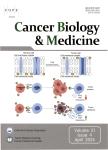Combining targeted therapy and immune checkpoint inhibitors in the treatment of metastatic melanoma
Combining targeted therapy and immune checkpoint inhibitors in the treatment of metastatic melanoma作者机构:Department of Surgery Massachusetts General Hospital Harvard Medical School Department of Melanoma Medical OncologyUniversity of Texas M.D.Anderson Cancer Center Department of Genomic MedicineUniversity of Texas M.D.Anderson Cancer Center Department of Surgical Oncology University of Texas M.D.Anderson Cancer Center
出 版 物:《Cancer Biology & Medicine》 (癌症生物学与医学(英文版))
年 卷 期:2014年第11卷第4期
页 面:237-246页
核心收录:
学科分类:1002[医学-临床医学] 100214[医学-肿瘤学] 10[医学]
基 金:NIH grants 1K08CA160692-01A1 U54CA163125-01 and the generous philanthropic support of several families whose lives have been affected by melanoma
主 题:Melanoma checkpoint blockade BRAF inhibition immunotherapy
摘 要:Melanoma is the deadliest form of skin cancer and has an incidence that is rising faster than any other solid tumor. Metastatic melanoma treatment has considerably progressed in the past five years with the introduction of targeted therapy(BRAF and MEK inhibitors) and immune checkpoint blockade(anti-CTLA4, anti-PD-1, and anti-PD-L1). However, each treatment modality has limitations. Treatment with targeted therapy has been associated with a high response rate, but with short-term responses. Conversely, treatment with immune checkpoint blockade has a lower response rate, but with longterm responses. Targeted therapy affects antitumor immunity, and synergy may exist when targeted therapy is combined with immunotherapy. This article presents a brief review of the rationale and evidence for the potential synergy between targeted therapy and immune checkpoint blockade. Challenges and directions for future studies are also proposed.



